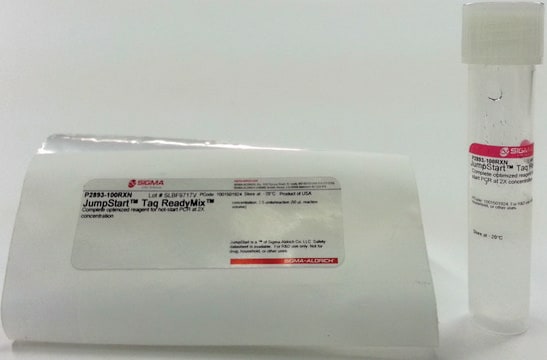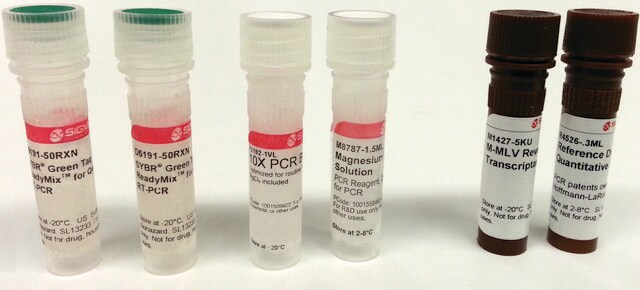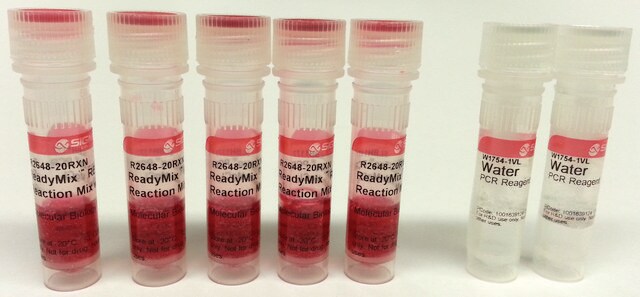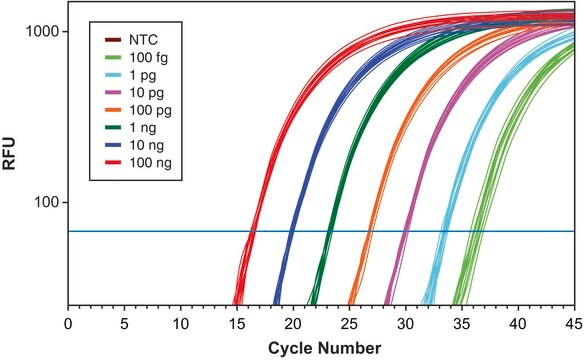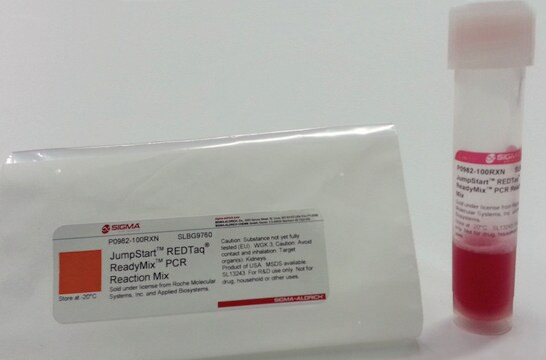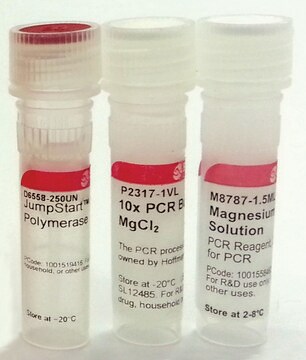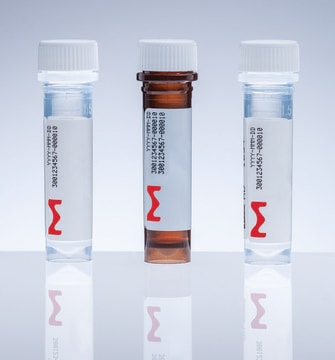D7440
JumpStart™ Taq ReadyMix™ for Quantitative PCR
For probe-based real-time PCR
Synonym(s):
hot start DNA polymerase, hot start PCR, hot start master mix, qPCR, real time quantitative PCR
About This Item
Recommended Products
form
liquid
usage
sufficient for 100 reactions
sufficient for 20 reactions
sufficient for 400 reactions
feature
Multiplex PCR
dNTPs included
hotstart
concentration
2.5 units/reaction (50 μL reaction volume)
technique(s)
qPCR: suitable
color
colorless
input
purified DNA
application(s)
agriculture
compatibility
Bio-Rad MyiQ ( )
Bio-Rad iCycler iQ
Bio-Rad iQ 5
for use with ABI 5700
for use with ABI 7000
for use with ABI 7300
for use with ABI 7500 Fast
for use with ABI 7500
for use with ABI 7700
for use with ABI 7900 Fast
for use with ABI 7900 HT
for use with ABI 7900
for use with ABI StepOne
for use with ABI StepOnePlus
for use with ABI ViiA 7
for use with Bio-Rad CFX384
for use with Bio-Rad CFX96
for use with Bio-Rad MJ Chromo4
for use with Bio-Rad MJ Opticon 2
for use with Bio-Rad MJ Opticon Cepheid SmartCycler
for use with Bio-Rad MJ Opticon
for use with Bio-Rad MiniOpticon
for use with Eppendorf® Mastercycler ep realplex2 s
for use with Eppendorf® Mastercycler ep realplex
for use with Illumina Eco qPCR
for use with Qiagen Corbett Rotor-Gene 3000
for use with Qiagen Corbett Rotor-Gene 6000
for use with Qiagen Corbett Rotor-Gene Q
for use with Roche LightCycler 480
for use with Strategene Mx3000P
for use with Strategene Mx3005P
for use with Strategene Mx4000
detection method
probe-based
shipped in
wet ice
storage temp.
−20°C
General description
Application
- for quantitative polymerase chain reaction (qPCR) amplification of HIV-1 RNA that is reverse transcribed and DNA using probes
- in a 2-step RT-qPCR assay for the quantification of reverse transcribed RNA in a study to monitor the activity of licorice in Treg cell differentiation and function
- as a component of the reaction mixture for the detection and amplification of Salmonella sp. and internal amplification control (IAC) pUC 19 plasmid DNA
- as a component of the reaction mixture for the detection of Clostridium difficile by quantitative polymerase chain reaction (qPCR)
- for quantitative real-time -PCR of reverse-transcribed ß-arrestin-1 (ARRB1) and β-arrestin-2 (ARRB2) mRNA
Features and Benefits
- Ultimate Convenience: ReadyMixes contain all components necessary for QPCR, simply add fluorescent detection chemistry, primers, and template
- Greater Specificity & Increased Target Yield: JumpStart™ Taq prevents non-specific amplification and increased target yield
- Maximum Flexibility: Suitable for use with a variety of detection chemistries including molecular probes and double-stranded binding dyes such as SYBR® Green I
- Designed for use with either plate/tube real-time thermal cyclers or capillary instruments
Packaging
Default reaction volume is 50 μL
20RXN is packaged as 1 X 500 μL
100RXN is packaged as 1 X 2.5 mL
400RXN is packaged as 1 X 10 mL
Other Notes
Principle
Unit Definition
Legal Information
This product is an Authorized 5′ Nuclease Core Kit. Use of this product is covered by one or more of the following claims outside the US corresponding to US Patent No. 5,210,015 and 5,487,972. The purchase of this product includes a limited, non-transferable immunity from suit under the foregoing patent claims for using only this amount of product for the purchaser′s own internal research. Separate purchase of a Licensed Probe would convey rights under US Patents and corresponding patent claims outside the US: 5,538,848, 5,723,591, 5,876,930, 6,030,787, 6,258,569, 5,804,375 (claims 1-12 only), and and claims outside the United States corresponding to US Patent No. 6,214,979. No right under any other patent claim and no right to perform commercial services of any kind, including without limitation reporting the results of purchaser′s activities for a fee or other commercial consideration, is conveyed expressly, by implication, or by estoppel. This product is for research use only. Diagnostic uses under Roche patents require a separate license from Roche. Further information on purchasing licenses may be obtained from the Director of Licensing, Applied Biosystems, 850 Lincoln Centre Drive, Foster City, California 94404, USA.
Signal Word
Warning
Hazard Statements
Precautionary Statements
Hazard Classifications
Aquatic Acute 1 - Aquatic Chronic 1 - Eye Irrit. 2 - Skin Irrit. 2 - Skin Sens. 1
Storage Class Code
12 - Non Combustible Liquids
Flash Point(F)
Not applicable
Flash Point(C)
Not applicable
Choose from one of the most recent versions:
Already Own This Product?
Find documentation for the products that you have recently purchased in the Document Library.
Customers Also Viewed
Articles
Method outlines use of a hot start Taq for multiplex qPCR and provides guidance on how to optimize dNTPs, primer, probes and MgCL2 concentrations. By optimizing these parameters, the user can improve assay sensitivity and linear range of detection.
Probe based QPCR utilizes a fluorescent–labeled target-specific probe resulting in increased specificity and sensitivity. Additionally, a variety of fluorescent dyes are available so that multiple primers can be used to simultaneously amplify many sequences.
Quantitative PCR (qPCR) provides information about gene expression, gene amplification or loss, and small alterations. qPCR is often used to investigate tumor biology and to discover the genetic and epigenetic causes of cancer
The polymerase chain reaction is one of the most widely used techniques in molecular biology. The PCR process consists of three main steps, Denaturation, Annealing & Extension
Related Content
RT-qPCR, or quantitative reverse transcription PCR, combines the effects of reverse transcription and quantitative PCR or real-time PCR to amplify and detect specific targets. RT-qPCR has a variety of applications including quantifying gene expression levels, validating RNA interference (RNAi), and detecting pathogens such as viruses.
Our team of scientists has experience in all areas of research including Life Science, Material Science, Chemical Synthesis, Chromatography, Analytical and many others.
Contact Technical Service